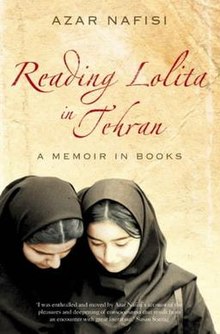"Do not, under any circumstances, belittle a work of fiction by trying to turn it into a carbon copy of real life; what we search for in fiction is not so much reality but the epiphany of truth."
"The desperate truth of Lolita's story is not the rape of a twelve-year-old girl by a dirty old man but the confiscation of one individuals life by another"
Azar Nafisi
Reading Lolita in Tehran
 Fiction is important. It's a fundamental way to make sense of reality and practice empathy. The story of Iran in the past forty years is not one that we experience often in the U.S., let alone a woman's perspective. In Reading Lolita in Tehran Azar Nafisi tells of her experiences teaching western literature in Iran during and after the revolution, first at university, and later, in secret, holding classes in her home for her committed female students. She tells of their stories and their experiences as seen through the lens of F. Scott Fitzgerald, Jane Austen, Henry James, and Vladimir Nabokov.
Fiction is important. It's a fundamental way to make sense of reality and practice empathy. The story of Iran in the past forty years is not one that we experience often in the U.S., let alone a woman's perspective. In Reading Lolita in Tehran Azar Nafisi tells of her experiences teaching western literature in Iran during and after the revolution, first at university, and later, in secret, holding classes in her home for her committed female students. She tells of their stories and their experiences as seen through the lens of F. Scott Fitzgerald, Jane Austen, Henry James, and Vladimir Nabokov.
This book was phenomenal. Part memoir and part literary critique, it offers an incredible in-depth look at the experiences of women in the Islamic Republic of Iran, their struggles with the restrictions of their personal freedoms, their arguments for and against the wearing of the veils,their stories becoming linked with the ones they read.
The writing in the book was fantastic. Nafisi is eloquent, her sentences are beautiful, and she tells her story with an incredible amount of compassion, teasing out the nuances of her and her students lives in the broader context of the politics of Iran, through the revolutions, the Iran-Iraq war, and the religious and political rhetoric.
This is a book that everyone should read if the are interested in the Middle East, women's rights, or western literature.
No comments:
Post a Comment